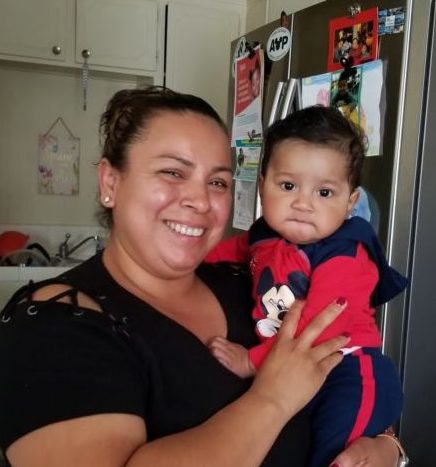When I was a toddler, my parents weren’t as involved in my early development as I would have liked them to be for several reasons, including work and language barriers. I didn’t know at the time, of course, how important it is that parents understand and fulfill the critical role they play as their child’s first teacher, but I still sensed that something was missing. I knew early on that when I started my family, I wanted to be 100 percent involved in my own children’s lives and education.
I’ve learned so much since then about the importance of early engagement with my baby and early brain development, thanks to organizations like ZERO TO THREE and the Pediatric Therapy Network’s Early Head Start program. My husband and I are much better parents thanks to their expert knowledge and guidance which has meant invaluable benefits for both our children, 7-month-old Baby Cruz and 5-year-old Christian.
Cruz and I made a deliberate decision to become fully engaged parents once our first son, Christian, was born. Even though we worked at different times of the day, I work in the evening and he works during the day, we shared responsibility in creating a fun learning environment for him. Recognizing the value of the early learning support we received with Christian, we didn’t hesitate to enroll our second child in the Well Baby program, the outreach program for newborns.
And it’s because we were involved from the start that we learned Christian needed pediatric therapy for speech and cognitive development. Having a child assisted with development issues that most parents take for granted is a difficult undertaking but there are advantages in being part of your child’s therapy routine.
The professionals, including registered nurses, who administer the therapy also provide parents with information on the benefits of healthy eating and living, the ability to create nurturing environments crucial for learning and how reinforcing learning habits help build a foundation for strong academic success later in life.
Having this knowledge and insight has transformed our approach as parents and how we view our role as teachers in our babies’ development.
But it shouldn’t take a developmental issue for parents to focus on the early learning aspects of their toddler or newborn baby. Learning should be an integral part of their daily activities. Babies should grow up enjoying learning as they enter pre-K or Early Head Start programs. Forming the foundation for learning will help them later in life as adults and give them a sense of focus.
The science is clear – babies’ brains grow faster between the ages of 0 and 3 than at any later point in life. In fact, their brains form more than 1 million new neural connections every second. I’ve learned that when babies have nurturing relationships, early learning experiences and good health and nutrition, those neural connections are stimulated and strengthened, laying a strong foundation for the rest of their lives.
Organizations like ZERO TO THREE have created awareness programs to inform parents and policymakers about the significant role early interaction and planning plays in the lives of infants and toddlers. Their social, emotional and overall cognitive development grows exponentially from birth to three, impacting a child’s life-long learning abilities.
I would urge parents with backgrounds similar to mine to not let language barriers, income levels or lack of a formal education interfere with your role as your child’s first teacher in life. Find the programs available in your community that are right for you and your baby. Seek out the expertise of organizations like ZERO TO THREE and learn what resources are out there to help create that learning foundation for your baby. Talk to your local elected officials about why it’s so important they support quality early learning programs.
We can all make a difference in a child’s life from the start if we know the facts and science behind development, are aware of programs and services set up to help us as parents and urge our representatives in state government to create or maintain early learning programs. It all starts if we collectively Think Babies.

